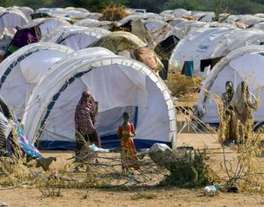Emergency Humanitarian Relief

_ There are two distinctly different types of foreign aid to developing nations. The first - development assistance - includes both financial and logistical assistance to support health, education and economic projects aimed at transferring skills and capacity building in local communities to lead to real, sustainable improvements in the lives of those affected. The second - emergency humanitarian relief - provides emergency food, water, shelter and healthcare to those affected by emergency situations where there is a lack of access to the basic necessities needed to sustain life. Emergency humanitarian relief, while it may not make the same sustainable and long-lasting contributions to society as development assistance does, is crucial for the well-being of societies in need. For decades, Sub-Saharan Africa has been plagued by emergency situations, caused by both nature and man. Drought is the most common naturally occurring emergency situation affecting the Horn of Africa region. Thousands starve to death each year because of droughts, but the situation would be exponentially worse without emergency humanitarian relief. Wars and violence are the most common man-caused emergency situation affecting the region. Victims of violence often arrive at refugee camps in immediate need of medical assistance and nutrition. Although the toll of war in Africa is huge, it would be significantly worse without emergency relief. Presently, millions of Somali refugees would be starving to death, victims of both drought and civil war, were it not for emergency relief efforts from around the world.
CGA's emergency humanitarian relief program provides both materials and logistical assistance for humanitarian relief in response to both naturally occurring and man-made crises. The primary objective of our efforts is to alleviate suffering, maintain human dignity and to save lives. During the post-election violence in Kenya in 2008, CGA distributed thousands of kilos of maize and beans to internally displaced peoples (IDP) camps within Kenya. We also provided medical assistance both in the form of providing medical staff and medicine to treat ailments. Presently, CGA is working to distribute food aid to the Turkana region of northern Kenya where the most serious drought in decades has already seen thousands perish from starvation. We have donated thousands of kilos of maize already and are planning another effort with more maize and beans. We are also working with the World Food Program to assist with their efforts in Somalia and in Dadaab, Kenya, where close to a million Somalis have fled the civil war to in search of food, shelter and peace. To learn how you can get involved with such urgent efforts, please contact us or visit our donations page.
You can support this initiative by donating:
CGA's emergency humanitarian relief program provides both materials and logistical assistance for humanitarian relief in response to both naturally occurring and man-made crises. The primary objective of our efforts is to alleviate suffering, maintain human dignity and to save lives. During the post-election violence in Kenya in 2008, CGA distributed thousands of kilos of maize and beans to internally displaced peoples (IDP) camps within Kenya. We also provided medical assistance both in the form of providing medical staff and medicine to treat ailments. Presently, CGA is working to distribute food aid to the Turkana region of northern Kenya where the most serious drought in decades has already seen thousands perish from starvation. We have donated thousands of kilos of maize already and are planning another effort with more maize and beans. We are also working with the World Food Program to assist with their efforts in Somalia and in Dadaab, Kenya, where close to a million Somalis have fled the civil war to in search of food, shelter and peace. To learn how you can get involved with such urgent efforts, please contact us or visit our donations page.
You can support this initiative by donating:
- Buy tent @ Kshs. 45000 (US$ 450)
- Provide a packet of rice and beans @ 650 (US$ 6.5)
- Provide filters @ Kshs. 2000 (US$ 20)
